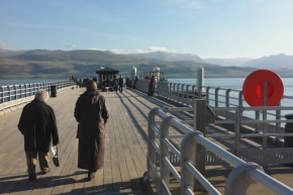 Daisy is just two years old, but the questions have already begun – ‘What’s this?’ ‘Why Pappy? It is often then a challenge to reflect on why it is, indeed, that we do certain things, or that things are the way they are! Of course ‘Why Pappy?’ is what theology is all about. Although I spent four years studying this in preparation for ministry, I have tended to be resistant towards pure academic study or research. For me it is important to be rooted in the practical and the ‘real’, but perhaps I neglect the reflection that would make purpose clear. Recently however, as I wrestle with the task of engaging the churches with those who are in Care Homes to a greater degree than they do, I have been reminded of the importance of asking the question. “If people are being asked to visit and work with the very elderly, they need to know the why? and the how?” stood out for me in a conversation with an academic gerontologist. And so I begin to seek an answer to the question and fill a gap that is yet to be filled – what is the theology of old age? … Why Pappy? If you read this and it prompts some thoughts that you could share – then please do!
0 Comments
 For a couple of days over the half-term holiday, Judy and I have visited Margaret (90) who lives on the isle of Anglesey in Wales. Margaret is a life-long friend of Judy’s Mum. They met as Welsh-speaking 5 year olds on their first day at school in Manchester and their relationship has lasted ever since. It is not that they have lived in each other’s pockets, but there have always been letters and phone calls. When Mum succumbed to dementia, the letters continued from Margaret recalling incidents and memories from the past that shaped the lives of each of them. Since Mum died in January, our lunch out in Beaumaris was full of memories as well as chat about families and friends. For me it was confirmation that memories are about much more than the past, because all that we experience through life contributes to who we are. Relationships exist beyond a physical relationship, they are simply part of who we are. They are about life now and in the future. In the beginning humankind obtained their life in relationship with God the creator. Adam and Eve, created for each other, formed the foundation for subsequent humanity and the entire Biblical story from that point on is about relationships between God and his people, between people and God. It is a relationship that makes us who we are and how we ‘tick’. It is not about physical meeting, but is a spiritual relationship. The climax of the story is focussed on Jerusalem’s town dump and a garden tomb. For our benefit, I imagine, we witness a death and a resurrection in physical terms, but in reality the eternal life which is Jesus’ promise to us is a spiritual relationship consisting a love freely given. It exists beyond time or place. It is a relationship that shapes who we are wherever and whenever. At the beginning of the Gospel story the disciples are invited by Jesus to ‘follow me’. Later, when Thomas declares that he does not know the way, Jesus replies ‘I am the way, the truth and the life’. It is in relationship with Jesus that we find our true life. So it is that a life of faith in Jesus is eternal. It is also why it is important that we remember with a meal – bread and wine. It is a relationship that shapes who we are in this life and the next. |
Archives
March 2024
|
 RSS Feed
RSS Feed
